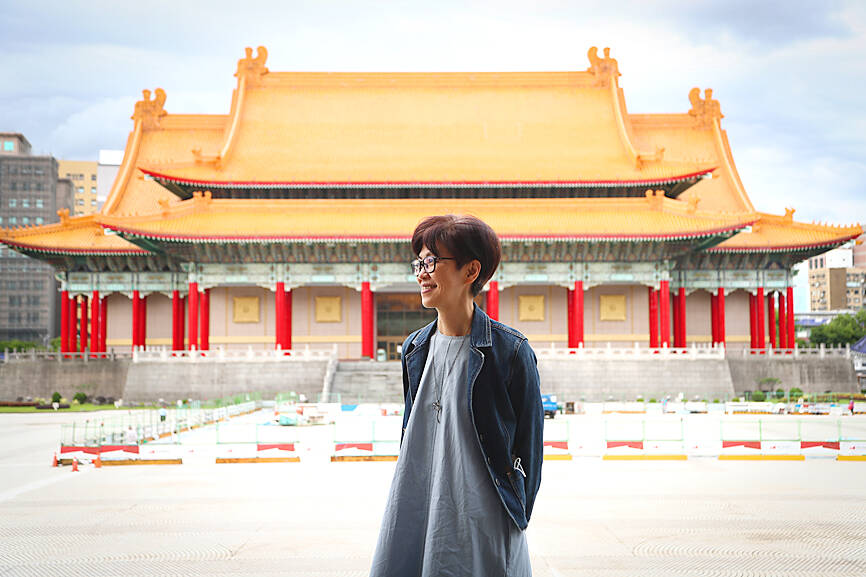The National Theater and Concert Hall (NTCH) has created tactile 3D models of its pipe organ for the visually impaired to experience one of the hall’s defining features.
A set of three models of the famous pipe organ at the National Concert Hall in Taipei were made at 1:30 scale, with some parts hand-carved and others made with 3D laser engraving technology, enabling the visually impaired to learn about the instrument through touch and sound.
The models seek to accurately represent the instrument’s intricate construction in its entirety, including its sophisticated construction and carvings, the NTCH said in a statement.

Photo: CNA
The pipes were made with two different materials, and the set also includes a representation of the keyboard.
They are to feature prominently in the hall’s guided touch tours on April 25 and May 29, which people can register for on the NTCH’s Web site, it said, adding that more sessions would be added.
The pipe organ was handmade by world-renowned organ-building company Flentrop in the Netherlands, tailored to the architecture and scale of the venue, the NTCH said.
The 9m-long, 14m-wide instrument was the largest pipe organ in Asia at the time of its completion, it said.
The NTCH has been striving to integrate the values of sustainability and inclusiveness into its operations in the past few years, NTCH general and artistic director Liu Yi-ru (劉怡汝) said.
Barrier-free access and facilities were incorporated in its Performing Arts Library during a renovation in 2021, while accessibility services such as performances accompanied by contextual subtitles and audio descriptions are offered at the theater and concert hall, she added.
Following the success of touch tours launched at the National Theater in 2017, the NTCH this year organized similar tours at the National Concert Hall to make the venue more accessible to the visually impaired.
The tour, which lasts about an hour, showcases the plaza outside the hall, the lobby, the seating areas and the pipe organ, the NTCH said.
Visitors are invited to familiarize themselves with the plaza and surrounding areas with a tactile guidebook, and are encouraged to “get a feel for” the marble walls and the handrails in the lobby, it said.

Taiwan has received more than US$70 million in royalties as of the end of last year from developing the F-16V jet as countries worldwide purchase or upgrade to this popular model, government and military officials said on Saturday. Taiwan funded the development of the F-16V jet and ended up the sole investor as other countries withdrew from the program. Now the F-16V is increasingly popular and countries must pay Taiwan a percentage in royalties when they purchase new F-16V aircraft or upgrade older F-16 models. The next five years are expected to be the peak for these royalties, with Taiwan potentially earning

STAY IN YOUR LANE: As the US and Israel attack Iran, the ministry has warned China not to overstep by including Taiwanese citizens in its evacuation orders The Ministry of Foreign Affairs (MOFA) yesterday rebuked a statement by China’s embassy in Israel that it would evacuate Taiwanese holders of Chinese travel documents from Israel amid the latter’s escalating conflict with Iran. Tensions have risen across the Middle East in the wake of US and Israeli airstrikes on Iran beginning Saturday. China subsequently issued an evacuation notice for its citizens. In a news release, the Chinese embassy in Israel said holders of “Taiwan compatriot permits (台胞證)” issued to Taiwanese nationals by Chinese authorities for travel to China — could register for evacuation to Egypt. In Taipei, the ministry yesterday said Taiwan

Taiwan is awaiting official notification from the US regarding the status of the Agreement on Reciprocal Trade (ART) after the US Supreme Court ruled US President Donald Trump's global tariffs unconstitutional. Speaking to reporters before a legislative hearing today, Premier Cho Jung-tai (卓榮泰) said that Taiwan's negotiation team remains focused on ensuring that the bilateral trade deal remains intact despite the legal challenge to Trump's tariff policy. "The US has pledged to notify its trade partners once the subsequent administrative and legal processes are finalized, and that certainly includes Taiwan," Cho said when asked about opposition parties’ doubts that the ART was

If China chose to invade Taiwan tomorrow, it would only have to sever three undersea fiber-optic cable clusters to cause a data blackout, Jason Hsu (許毓仁), a senior fellow at the Hudson Institute and former Chinese Nationalist Party (KMT) legislator, told a US security panel yesterday. In a Taiwan contingency, cable disruption would be one of the earliest preinvasion actions and the signal that escalation had begun, he said, adding that Taiwan’s current cable repair capabilities are insufficient. The US-China Economic and Security Review Commission (USCC) yesterday held a hearing on US-China Competition Under the Sea, with Hsu speaking on